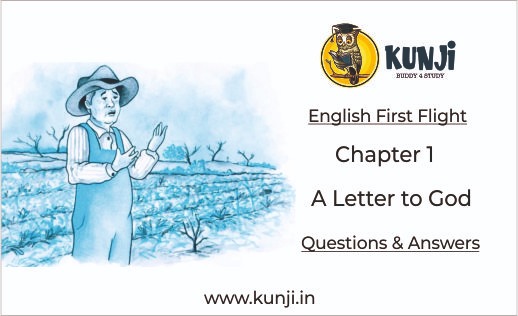NCERT Solutions for Class 10 English: First Flight Chapter 1 – A Letter to God
All the NCERT Solutions for Class 10 English First Flight Chapter 1 – “A Letter to God” from First Flight Book. the answers have been given after a detailed analysis of the marking scheme of the CBSE. The answers provided can be referred to as quick and effective learning. Also, these solutions have been prepared by the experts and are based on the latest CBSE syllabus and exam pattern.
Also See: NCERT Solutions for Two Stories About Flying Class 10 English First Flight Chapter 3
A Letter to God Class 10 English First Flight Chapter 1 Question Answers
Question 1: Who does Lencho have complete faith in? Which sentences in the story tell you this?
Answer: Lencho had a firm faith in God. The following sentences in the text shows this:
- “God,” he wrote, “if you don’t help me, my family and I will go hungry this year.”
- He wrote ‘To God’ on the envelope, put the letter inside and, still troubled, went to town.
- God could not have made a mistake, nor could he have denied Lencho what he had requested.
Question 2: Why does the postmaster send money to Lencho? Why does he sign the letter ‘God’?
Answer: The postmaster sent money to Lencho because he wanted to keep alive Lencho’s trust in God. As he read the letter given by Lencho he grew serious and wished he had the same faith in God. Even after knowing that Lencho had asked for money, he stuck to his pledge to answer the message. He collected money as much as he was able to and sent it to Lencho. He signed it as God so as not to shake Lencho’s faith in him.
Question 3: Did Lencho try to find out who had sent the money to him? Why/Why not?
Answer: no, Lencho never tried to find out who had sent the money because he was very sure that no one else than God would send him the money. He has strong faith in God also he believed that God had sent him the money.
Question 4: Who does Lencho think has taken the rest of the money? What is the irony in the situation? [Remember that the irony of a situation is an unexpected aspect of it. An ironic situation is strange or amusing because it is the opposite of what is expected.]
Answer: Lencho thought that the majority of the money had been taken by the post office workers. Here the irony was that the workers that he called “a bunch of crooks” and accused them of stealing some of the money had actually contributed their shares to send him the money.
Question 5: Was Lencho surprised to find a letter for him with money in it?
Answer: Lencho was not surprised to see the letter and money inside it because of his confidence and faith in God. anyhow he was expecting a reply from God.
Question 6: What made him angry?
Answer: Lencho became furious when he counted the money. As the envelope held only seventy pesos. He was very sure that God would not make a mistake, and he will never refuse him what he had asked. Therefore, he assumed that the remaining thirty pesos would have been taken by post office employees.
Question 7: Are there people like Lencho in the real world? What kind of a person would you say he is? You may select appropriate words from the box to answer the question.
| Greedy | Naïve | stupid | ungrateful |
| selfish | comical | unquestioning |
Answer: There might be a few people who are like Lencho in the real world. He is an unquestioning and naïve kind of person.
Question 8: There are two kinds of conflict in the story: between humans and nature, and between humans themselves. How are these conflicts illustrated?
Answer: The hailstorms showed a conflict between human beings and nature which has destroyed Lencho’s crops. Lencho has always been working very hard on his fields and the harvest was very important for him. He required the money because he needed to feed his family. But nature turned violent. The rain and hailstorm have killed his crops. The conflict was between people themselves. The postmaster gave Lencho the money which he raised with the help of other post office staff. They were not at all linked to Lencho but still, they helped him. It was an act of generosity and selflessness on their part, but still, Lencho has blamed them for taking some money away. He called them “a crooks ‘bunch.” This shows that man has no faith in his fellow human beings, and thus gives rise to this conflict.
Question 9: There are different names in different parts of the world for storms, depending on their nature. Can you match the names in the box with their descriptions below, and fill in the blanks? You may use a dictionary to help you.
| gale, | whirlwind, | cyclone, |
| hurricane, | tornado, | typhoon |
- A violent tropical storm in which strong winds move in a circle: __ __ c __ __ __ __
- An extremely strong wind: __ a __ __
- A violent tropical storm with very strong winds: __ __ p __ __ __ __
- A violent storm whose centre is a cloud in the shape of a funnel: __ __ __ n __ __ __
- A violent storm with very strong winds, especially in the western Atlantic ocean: __ __ r __ __ __ __ __ __
- A very strong wind that moves very fast in a spinning movement and causes a lot of damage: __ __ __ __ l __ __ __ __
Answer:
- Cyclone
- Gale
- Typhoon
- Tornado
- Hurricane
- Whirlwind
Question 10: Join the sentences given below using who, whom, whose, which as suggested.
- I often go to Mumbai. Mumbai is the commercial capital of India. (which)
- My mother is going to host a TV show on cooking. She cooks very well. (who)
- These sportspersons are going to meet the President. Their performance has been excellent. (whose)
- Lencho prayed to God. His eyes see into our minds. (whose)
- This man cheated on me. I trusted him. (whom)
Answer:
- I often go to Mumbai, which is the commercial capital of India.
- My mother, who cooks very well, is going to host a TV show on cooking.
- These sportspersons, whose performance has been excellent, are going to meet the President.
- Lencho prayed to God, whose eyes see into our minds.
- This man, whom I trusted, cheated me.
Also See:
- Dust of Snow English Poem 1 Summary, Explanation
- Fire and ICE English Poem 2 Summary, Explanation
- A Tiger in the Zoo Poem 3, Summary, Explanation, Solutions
- How to tell Wild Animals Poem 4
- The Ball Poem 5 Summary, Explanation
- Animals Poem 6, Summary, Explanation, Solutions
- The Trees Poem Poem 7, Summary, Explanation, Solutions
- Mijbil The Otter Chapter 8 Class 10 English
- Madam Rides the Bus Class 10 English Chapter 9
- Glimpses of India Chapter 7 English Class 10
- A Letter to God Class 10 English First Flight Chapter 1
- Two Stories About Flying Class 10 English First Flight Chapter 3
- Long Walk to Freedom Class 10 English First Flight Chapter 2
- The Diary of Anne Frank Class 10 English First Flight Chapter 4
- The Hundred Dresses Part 1 Chapter 5 Class 10 English First Flight
- The Hundred Dresses-II Chapter 6 Class 10 English First Flight





